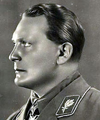[This is Section 18 of Nietzsche and the Nazis.]
18. Militarization
The most important part of the new Germany was the military. On a historically unprecedented scale, the German economy became a war economy.
 Conscription had been reintroduced in 1935, and in 1936 Hermann Göring took over as Germany’s economic minister. Under Göring’s direction, Germany began to develop a total war economy in earnest. Up until this time, the re-militarization of Germany had been kept semi-secret and had been largely paid for by funds confiscated from enemies of the state and blocked foreign bank accounts.
Conscription had been reintroduced in 1935, and in 1936 Hermann Göring took over as Germany’s economic minister. Under Göring’s direction, Germany began to develop a total war economy in earnest. Up until this time, the re-militarization of Germany had been kept semi-secret and had been largely paid for by funds confiscated from enemies of the state and blocked foreign bank accounts.
Under Göring’s leadership, the re-militarization came out into the open. Göring started a Four Year Plan to make Germany self-sufficient so that it would be able to survive blockades during a war: he reduced imports to a minimum, put price and wage controls in place, built factories to produce rubber, textiles, fuel, and steel—all commodities essential to a war machine—and taxes were increased greatly upon private businesses to fund the war.
Also as promised as long ago as 1920 in the Nazi Party’s founding political program, the Nazis initiated a strategy of geographical expansion. In 1936, Germany re-occupied the Rhineland. Also in 1936, Hitler concluded an alliance with Mussolini and Italy and sent troops to Spain to support General Francisco Franco’s authoritarian regime. There was no military response from France, England, or the other Allied powers.
In 1938, the Germans took over Austria; no shooting or violence was necessary. After the takeover, a plebiscite was held in which one could vote yes or no for Hitler: In Austria, 99.75% voted for Hitler; in Germany, 99.08% voted for Hitler. Hitler was angry that he received a slightly lower level of support from the Germans than he did from the Austrians. Again there was no military response from the Allies. Instead they believed Hitler was satisfied. They still believed him when he signed the Munich Agreement promising no more expansion beyond the Sudetenland, then a key part of Czechoslovakia. As a result of that agreement, Hitler was named Time magazine’s Man of the Year for 1938.
Early in 1939, the Germans took over all of Czechoslovakia. Again there was no military response from the Allies.
But on September 1, 1939, the Germans invaded Poland, and this time the western Allies responded.
World War II had officially begun, and the twentieth century began its second great collision of incompatible philosophies of life—with the broadly liberal, individualistic, democratic, and capitalist Allies of the west at war with the authoritarian, collectivistic, and socialistic Axis powers of the east. And at the end of the war, tens of millions more people would be dead.
The Germans were steeled for war and well prepared physically and psychologically. They believed in Lebensraum—in the rightness of Germany’s expanding as much as necessary to acquire land and resources to survive. They believed in the rightness of Germany’s expanding to re-incorporate ethnic Germans now living in foreign lands. They believed that Germany had a moral mission—even a divine mission—to show the world the way to a brighter, idealistic future and to destroy the tottering and depraved capitalist nations of the West. As Hitler put it at the beginning of the war: “What will be destroyed in this war is a capitalist clique that was and remains willing to annihilate millions of men for the sake of their despicable personal interests.”[41]
And of course, the Germans had plans for the Jews.
References
[41] Quoted in Lukacs 1991, p. 121.
[Bibliography.]
[Return to the Nietzsche and the Nazis page. Go to the StephenHicks.org main page.]